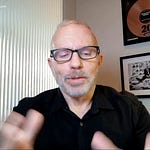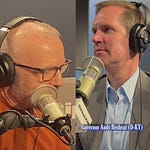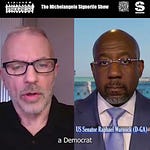The Signorile Report is reader-supported. If you’ve valued reading The Signorile Report, consider becoming a paid subscriber and supporting independent, ad-free opinion journalism. Thanks!
How extreme has the “manosphere” become, and why should you know all about it?
Justin Horowitz, a researcher at Media Matters, took a deep dive into it, reporting back on the misogynistic “micro-influencers” who are proliferating. He came on my SiriusXM program to share more of his reporting and insights, and explained why it’s something we need to keep a sharp eye on.
These micro-influencers are taking forward the message of mega-influencer Andrew Tate, notorious for promoting ugly and vicious attacks on women to millions of followers on social media platforms, some of which he was eventually banned from. Tate was arrested and detained in prison last December in Romania for alleged rape and human trafficking, and he’s still being held in jail. But that doesn't mean that what he’s promoted is gone from the Internet, as an army of young men take up the cause and bring in many more.
Listen in to my conversation with Justin Horowitz on my SiriusXM show. Below is a slightly condensed transcript that is also slightly edited for clarity.
Michelangelo Signorile: So you wrote all about the misogynistic “manosphere.” And before we get into that, [tell us] about Andrew Tate, who I think a lot of people know about, but a lot of people probably don't know about him. For a lot of people, they first heard about him, in fact, when he was arrested, because that really got a lot of news. And there was that great moment with Greta Thunberg that just became a viral phenomenon. So talk a little bit about him first for our listeners who may not know much about him.
Justin Horowitz: Sure. So Andrew Tate is a former former professional kickboxer. I'd say he's a British media personality. And I think most people started to really hear his name when [he] started to show up on their social media accounts. So what Tate was doing was he was paying this army of young men to to repost his content. He was banned on pretty much all social media. And he had all of these young men reposting his content, whether that on be TikTok, YouTube, anything like that. So people started to realize who he was once they were hearing all of the vitriol and misogynistic rhetoric that was coming from him.
MS: And he was arrested. As I said, it became quite a big news moment. And there was some discussion about whether or not he actually set a trap for himself because of the pizza box that was there and the address. Whatever happened, the Romanian authorities closed in on him for human trafficking. Talk a little bit about that.
JH: So he was arrested by Romanian authorities for alleged rape, human trafficking and organized crime. He and his brother are currently sitting in a Romanian jail waiting to face trial.
MS: And obviously he can't be online. But as you discuss the army of people who have been promoting and spreading this hate are out there and in the manosphere. These influencers who are proliferating across social media. Tell us a bit about that and Andrew Tate's influence on these young men.
JH: So the manosphere is kind of this umbrella term to understand this online community of right wing websites, bloggers, influencers that sort of cultivate a worldview based on conservative and outdated gender politics, kind of repackaged for the Internet age. It valorizes pickup artists, violent misogynists, incels men's rights advocates. What the group really focuses on is that they blame women for all sorts of societal woes, and they treat them as this inferior sex. They believe that men have the right to own and berate and be horrible to women because that's their worldview. And Andrew Tate is kind of like the tip of the iceberg when it comes to the manosphere. There are a bunch of micro-influencers across social media that are sort of repackaging his violent misogyny for their own profit and social media fame. I feel that Andrew Tate is the one that most people know when it comes to someone in the manosphere. But there are other right wing pundits, people like Matt Walsh or Mike Cernovich, who have been part of the manosphere for years. But Andrew Tate has really been the one that's been in the news most recently as kind of a manosphere influencer.
MS: Some of our listeners will be familiar with Matt Walsh and Cernovich, but tell us a bit about what they're doing now, what they're promoting and what you're seeing as obviously Andrew Tate is no longer able to be online.
JH: So these micro-influencers are repackaging Andrew Tate's violent misogyny for their own audiences. And what they’re doing is they're really kind of speaking to the fears and the real lives of young men. So things like rejection, alienation, economic failure, loneliness, all of these worries that young men usually don't talk about in person. They're looking for influencers to look up to. That kind of speaks to those issues. And there aren't a lot of influencers that can speak to young men in the way that these young men also respect. So whether it's talking about picking up women, monogamy, non-monogamy, how to make money or make a name for yourself online, these are the sort of topics these manosphere influencers are really pushing. And they oftentimes draw in these viewers and these audiences because they'll start talking about things like weightlifting or working out. It's a really good way for these influencers to really draw in an audience of young men.
MS: Talk a little bit more about that, because I think it's quite fascinating and I think not something a lot of people really get in terms how these young men are almost indoctrinated into something that is is filling a void, some sort of need, something that went on maybe in their own lives, something that's missing that they can't fill. And it kind of puts them into a different direction.
JH: So it's kind of similar to the way that people fall into conspiracy theories. I wouldn't say that they're the same, but when there's a hole missing in the information that someone is trying to learn about, sometimes it's easier to lean on something like a conspiracy theory where there's a straightforward answer to why something is the way it is. Obviously, things usually have more nuance to them, but this feels the same in a way.
Oftentimes when people are thinking about like, why am I getting rejected by women? Like why? Why can't I be as social as the other people I see around me? Why can't I be as strong or as motivated to work out as some of these other people, these influencers? They're really giving these young men an answer to their problems and the answer to their problems that they're telling them is that women are the problem. They have this phrase in the manosphere called the “red pill.” I'm sure that some of your audience has heard of the red pill before. And the idea of taking the red pill means you're going further to the right. But in the manosphere particularly, it means that you come to this understanding that women are the root of all problems and all evil. If you take the red pill, it's a way for you to kind of understand life from the point of view of women are the reason that I'm not getting laid or women are the reason that I'm not getting paid more at my job. So it's just a really easy way for men to see the world through a really, really misogynistic lens.
MS: And a lot of them are lonely or, as you said, maybe they felt rejection. Something happened. A lot of these podcasts will focus in on fitness and how to remake your body and obviously homing in on masculinity. This is a major part of what's going on here, an insecurity about masculinity and how to somehow repackage themselves while still blaming, of course, others.
JH: Yes, it's definitely a way to completely rebrand yourself. I think that men that are looking up to these influencers, they see it as a really easy fix for a lot of different problems in their life, whether that be physical or mental or emotional.
MS: One of the ones you mentioned, Fresh and Fit podcast, sounds like something, you know, innocuous, right? But how is it something that draws people in to something more nefarious?
JH: So the they call themselves the number one men's podcast in the world. And they say that their show is about females, fitness and finances. But it's not to say that they don't talk about those things. They do. But I think that why people go to them and listen to their podcast is because it's for this insane misogyny. I mean, after listening to hours of this podcast, I don't think I've heard another show that is, I would say mainstream like this, that has such vitriol. I think that a big part of it is that it's very edgy. You're not finding a lot of podcasts like this out there, so when you're able to kind of bring people in, like we're going to talk about fitness, we're going to talk about finances. And the other thing is they have a lot of women on their show. A lot of women volunteer to go on this show, which may make you think that there's a possibility that they will be able to, like, speak their truth as well and be able to hold their own.
But a lot of these episodes, they’re the hosts just berating and belittling these women. And I can't really wrap my head around why some of these women would want to go on the show. But it happens. And I feel like it kind of seems like a way for some people to say, well, women are going on the show, so it can't be that bad. But actually listening to it and taking the time, it's pretty disgusting.
MS: Well, among some of the podcasts that you talk about and some of the people who are hosts of the podcasts, is a female misogynist. H. Pearl Davis. Tell us a bit about H. Pearl Davis.
JH: Yeah. So she's actually a really interesting influencer among these manosphere influencers. She, I think, is a unique case because her rhetoric is the same kind of rhetoric you would find on the Fresh and Fit podcast, as you said, or some of these other extremist platforms. I mean, she recently invited someone like white nationalist Nick Fuentes on her show where she let him ramble on and on about, you know, his vision for an ethnostate and his anti-Semitic views. And she agreed with some of them. And it's just interesting because it almost doesn't matter that she's a woman. The fact is that she's pushing the same toxic anti-feminist men's rights rhetoric, like I said, with the women that go on the Fresh and Fit podcast. Maybe it seems like it would be different because she is a female, but it's really, really the same kind of rhetoric you'll find on the other platforms as well.
MS: After listening to these and just seeing the reach of these audiences, what what do you kind of take from it in terms of what can be done about it? What do we as a society do?
JH: So I would say one of the most important aspects that's it’s going to come down to is, these people are using social media to further their message. So the social media platforms have a responsibility to not have this violent misogyny on their platforms. A lot of them have policies against hateful content or violent content speaking about violence. And a lot of them are just — they're not doing their due diligence, for example.
MS: This is beyond the ones that are on Telegram, which allows all this. You're saying the social media platforms that claim to have all of these policies like Twitter, like Facebook, like others.
JH: Yes. And I would say TikTok in particular is one that is the easiest for young people to be radicalized into these manosphere spaces. For example, like to the Fresh nd Fit podcast and another influencer I wrote about, Nico. They are both banned on the platform, yet there are so many burner accounts and fan accounts that will continuously repost the content. And that's what Andrew Tate did after he was banned from all these platforms.
Like I said, he had an army of young men reposting his content. So when you have people like Fresh and Fit podcast and there's, you know, billions of views on TikTok under hashtag fresh and fit podcast, TikTok has a responsibility to flag these things and understand you banned the fresh and fit official account.
And then I would also say for young kids, I would say parents have to do their due diligence as well to make sure that their kids aren’t listening to and watching these influencers that can lead to really toxic rhetoric. I know that I linked to one story in my report about how a kid as young as 11 years old was repeating rhetoric from Andrew Tate. So parents really need to know what their kids are listening to, especially on platforms like TikTok.













